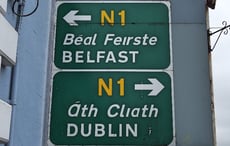A Dunnes Stores worker who in 1984 sparked a strike and the banning of South African goods in Ireland by refusing to handle a South African grapefruit has said she and her fellow strikers would "love" to attend Nelson Mandela's funeral.
“It would be a lovely way to say ‘goodbye’,” Mary Manning told the Irish Times, in response to calls for the strikers to form part of Ireland’s official representation at next week’s funeral services in South Africa.
It now seems likely they will after labor unions in Ireland announced support for their trip.
On July 19, 1984, when Manning was 21, she and two colleagues, shop-steward Karen Gearon (then 20) and Alma Russell (then 18), were on the checkouts at the Henry Street branch.
“There was a union instruction that we weren’t to handle South African goods. We actually had to go around the shop two days before to see what were South African goods.
“I remember the woman coming toward the tills with the grapefruit in her basket and we were all looking at each other wondering which till she’d pick. She came to me. I told her it was a union instruction and I couldn’t handle the grapefruit. She was happy to leave them back, but a manageress was watching and I was taken off the till and suspended.”
Russell said she and Gearon “turned off our registers and walked out with Mary to go up to the union.” They ran into colleague Liz Deasy (then 16), on their way out.
“It was my first job,” says Deasy. “It was the ’80s and I was lucky to have a job, but my father was very strong on unions. In our house you knew if there was a picket you did not cross it. So when they told me there would be a picket on the shop I just said, ‘Well I’m coming with you.'”
“It was a gorgeous sunny day,” recalls Deasy. “I thought, ‘This is great. I hope it lasts to the end of the weekend.'”
The picket would last for two years and nine months. The eleven young women who manned the shop's three entrances took pay cuts from about £90 a week to a strike pay of £21 and later £23 a week.
Gearon says a black South African, Nimrod Sedaka, joined the picket and told them about apartheid.
“The longer the strike went on the stronger we got. We were determined we were not going back to work if we had to handle South African goods. I think even if there was a union instruction to go back, we wouldn’t have.”
The strikers remember not only the support they got, but also abuse from both the public and non-striking colleagues.
“People were asking why we were striking for ‘niggers’,” says Russell. “Co-workers passing the picket would be physically abusive, push us around. They’d drop their tea bags out of the canteen window above, onto us.”
The strikers received an invitation to meet Archbishop Desmond Tutu in London in October 1984. Gearon called it a "turning point."
“It raised the profile of what we were fighting for nationally and internationally. That was hugely important.”
The strike ended in April 1987 when Ireland became the first country to ban South African goods.
Gearon says the strike was “vitally important” and she is “extremely proud” to have been part of it.
“People told us at the time we were fools, asked why we were striking for something going on thousands of miles away," she said.
Deasy also said she is “extremely proud. There were times we wondered were we getting anywhere, was anyone listening to us. It took us almost three years but we got what we wanted. It took Nelson Mandela 27 years. If you believe something is right and it’s worth fighting for you’ll get there in the end.”
Gearon believes they should be at the funeral."We should be there. It would a wonderful acknowledgment of our contribution to Mandela’s achievement.”
Nine of the women met Mandela at a lunch in Dublin 1990. Two of the strikers, including Manning, were in Australia at the time.
Archbold said: “Yes, I’d love to see some or all of them there, especially Mary who never got to meet Mandela when he was in Dublin in 1990. I think she should be there.”
The Irish Times reports that Fianna Fáil spokesman on foreign affairs Brendan Smith has also called for the strikers to be represented at Mandela’s funeral.




Comments